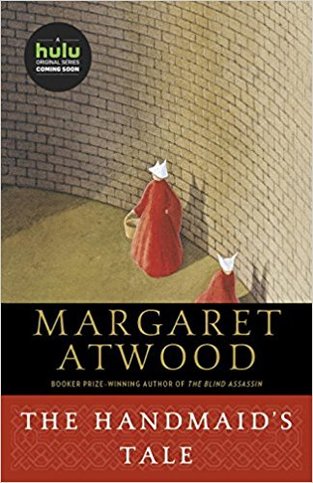 I don’t think I need to give an introduction to what “The Handmaid’s Tale” is about. It’s been around since 1985 and is now a Hulu series, so chances are, you’ve at least heard of it. In short, it’s heralded as the feminist warning of a dystopian future where women have every single one of their rights taken away. They are used, and abused, regulated to roles of either procreation or house maintenance. They cannot leave their house and walk wherever they want, their clothes become habits, and are color coded to fit their roles. Life for women under extreme Judeo-Christian beliefs is terrible in Atwood’s book, there’s no doubt about it. But, despite the acclaim this book gets, this is one of those books that was made better when it transitioned to the small screen. Just because your book is a comment on societal trends, and is meant to be a warning for the future, does not mean you can simply ignore important story elements. We are told the story of Offred, a Handmaid in this new world order of what was once Maine. She has lived in both worlds, going from wearing shorts and tank tops, to her new robe that covers her head to foot. She remembers what her life was before, she was married and had a child before, she could read books before, and now she is a Handmaid. She is the property of other men in hopes she will bear their children when their wives cannot. She’s understandably depressed and terrified, but she’s also a bit wishy-washy, she doesn’t have the spine or fire you want from a woman like this. She doesn’t seem to ever fight the system, just be swept up by it, and then when others rebel, she just kind of goes along with it. She’s never the instigator I wanted, the champion I was hoping for. But ok, fine, this is different, this is meant to serve as speculative fiction, just a warning based on trends, but still, it’s hard to buy that a woman who had her own money, and could spend said money, goes from relatively independent and normal, to this “follower” so fast.
Rights can erode, you can see things begin to slip and turn in the name of “national security” and what not. But it does not happen almost completely overnight, or over the span of one year, it’s hard to tell the timeline in Atwood’s book, either way, its super-fast and no one, and I mean no one, ever fights back, notices, or tries to turn the tide. Yeah right, I don’t buy that. So the entire time I’m reading this book, I keep asking how this even happened, and it never gets answered. You get snippets here and there, and the epilogue tries to do a better job of telling you how it all happened, but it felt bland and not enough given the world Atwood sets up by that point. The conflict is always just hinted at by the narrator. A vague idea that there is a fertility crisis (not how that happened, either), some unidentified people are fighting somewhere over something, America’s politicians are all killed by someone for some reason, but it never gets explored. It’s just this tidbit left here or there that you pick up and hope that “yes! Finally! Answers!” but no. Atwood’s entire dystopian world is about how all men are evil, and out to screw over (literally and figuratively) everyone with a vagina they can. Never mind how suddenly all men became evil pricks, let’s not focus on how so many women decided this was a good idea overnight, no, let’s just focus on the fear of what could happen if things went so far so fast. Now just because I wasn’t a fan of this story, does not mean I am not a feminist. That I am not worried about the discourse going on around women, basic human rights, and reproductive health. Because I am. But I don’t need to, or should have to, prove that just because this book fell short. Had the world building been there, had Atwood spent more time on that rather than creating this disorienting way of presenting her work, I would absolutely be more on board. But, like I said, plot holes aren’t pretty, highbrow literary fiction. They’re just plot holes. The book is a classic though, so it’s hard to say “skip it”. Read it if you want to, absolutely. Atwood creates some lovely imagery with her prose throughout sections of the book. But Hulu’s adaptation of the novel addresses the plot holes in a way Atwood doesn’t, so maybe watch that instead? Or at least, watch that first. As this is the first time I have ever recommended the show (or movie) over the book, I’m giving this book 2 stars. Don’t hate me.
0 Comments
Leave a Reply. |
Click the book images to see them on Amazon!
Categories
All
|






 RSS Feed
RSS Feed



















